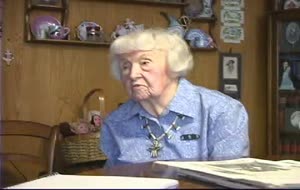Search the Special Collections and Archives Portal
Search Results

Video clip of interview with Gay (Gertrud Anne Yoder) Kauffman, October 11, 2006
Date
Archival Collection
Description
Moving Image
Susan Watson oral history interview
Identifier
Abstract
Oral history interview with Susan Watson conducted by Claytee D. White on February 20, 2013 for the Boyer Early Las Vegas Oral History Project. Watson discusses graduating from Rancho High School in 1962 and working as a dental assistant and an interior designer.
Archival Collection
Vera Love oral history interview
Identifier
Abstract
Oral history interview with Vera Love conducted by Sophia Phillips on March 11, 1981 for the Ralph Roske Oral History Project on Early Las Vegas. In this interview, Love talks about real estate development in Las Vegas, Nevada. She specifically talks about the role of women in real estate and business ownership, schools, and city growth in early Las Vegas.
Archival Collection
J. K. Houssels, Sr. oral history interview
Identifier
Abstract
Oral history interview with J.K. Houssels Sr. conducted by an unknown collector on November 12, 1975 for the Ralph Roske Oral History Project on Early Las Vegas. Houssels discusses his ownership of the Las Vegas Club casino on Fremont Street in Las Vegas, Nevada in the 1930s. Houssels also discusses other casino partnerships that he invested in, and the casino business.
Archival Collection
Amalette Wilson oral history interview
Identifier
Abstract
Oral history interview with Amalette Wilson conducted by Koh Swee Huat on May 10, 1976 for the Ralph Roske Oral History Project on Early Las Vegas. Wilson discusses Boulder City, Nevada and the Hoover (Boulder) Dam.
Archival Collection
Nancy Leveque oral history interview
Identifier
Abstract
Oral history interview with doctor Nancy Leveque conducted by Robin Wright on July 03, 1975 for the Ralph Roske Oral History Project on Early Las Vegas. The interview covers, among many wide-ranging topics, Leveque’s move to and away from Las Vegas, her career as a veterinarian, and the practice she and her then-husband built. Leveque also discusses how the city of Las Vegas has changed—environmentally and socially—, special interest groups and social activities, as well as natural phenomena. Throughout the course of the interview, Leveque provides anecdotes about prominent figures and old Las Vegas traditions, such as Helldorado.
Archival Collection
Irving Kirshbaum oral history interview
Identifier
Abstract
Oral history interview with Irving Kirshbaum conducted by Cheryl Rogers on February 23, 1979 for the Ralph Roske Oral History Project on Early Las Vegas. In this interview, Kirshbaum discusses the Riviera Hotel where he began working in 1955. He also talks about the landscape of the Las Vegas Strip in the 1950s, and the state of gambling, comps, customer service, and dealer training. Kirshabum discusses the treatment of minorities at the Riviera and in Las Vegas, Nevada generally.
Archival Collection
Linda Hartley oral history interview
Identifier
Abstract
Oral history interview with Linda Hartley conducted by Pauline Marchese on March 10, 1978 for the Ralph Roske Oral History Project on Early Las Vegas. During the interview, the two discuss Hartley’s personal history, such as schools that she had attended and her recollection of local recreational activities. The two go on to talk about changes in crime, the environment, and briefly discuss a variety of issues at the time, including: segregated schools, prostitution, and effects of the Nevada Test Site.
Archival Collection
Valerie Tuftland oral history interview
Identifier
Abstract
Oral history interview with Valerie Tuftland conducted by Phyllis McKinnon on October 21, 1985 for the Ralph Roske Oral History Project on Early Las Vegas. In this interview, Tuftland reflects upon her experience as a nurse practitioner in Las Vegas, Nevada. She discusses her training, challenges that she has faced throughout her career, and qualifications that she would look for in nursing candidates.
Archival Collection
Ellen Lempe oral history interview
Identifier
Abstract
Oral history interview with Ellen Lempe conducted by Paul Pearson on March 23, 1977 for the Ralph Roske Oral History Project on Early Las Vegas. Lempe discusses arriving to Las Vegas, Nevada in 1952 and recalls her experiences as a telephone operator. Lempe then discusses the various recreational activities that Las Vegas, Nevada had to offer.
Archival Collection
